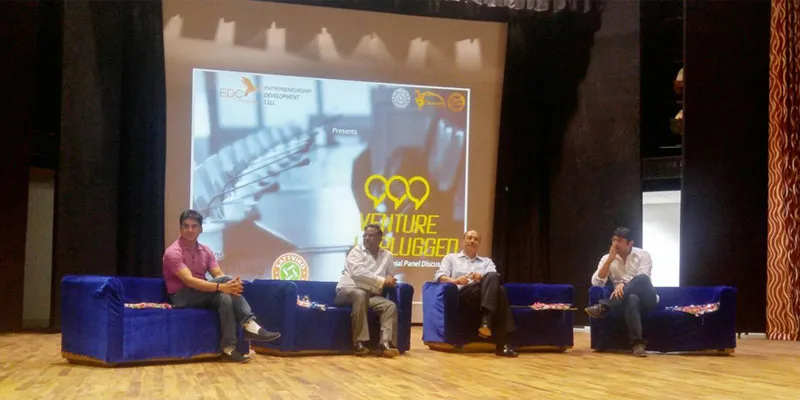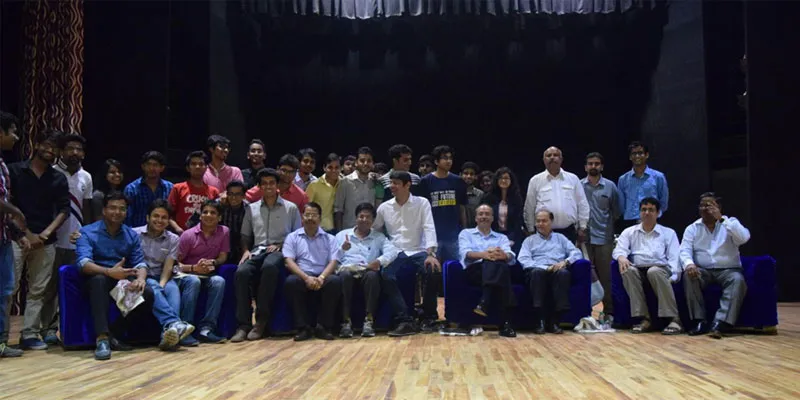From the startup rockstars, a lesson on success, failure and everything in between
The Past and the Present
The year was 1847 when a young Commander-in-Chief of Northern Province of the Royal British Army envisioned a grand structure that could have the power to harness the might of River Ganges, eventually giving life to the barren lands of northern India. The Solani Aqueduct, apart from being a Civil Engineering marvel and a standing symbol of excellence of human potential is also the reason why the white beauty of Indian Institute of Technology, Roorkee came into existence in the first place.

(Indian Institute of Technology, Roorkee - Main Building | photo courtesy: Sanyam Bahga )
One-sixty-eight years later, IIT-Roorkee, previously known as the Thomason College of Civil Engineering, is now recognised as one of the premier institutes of technology in India. With the alumni making their mark in the world, IIT-R is in no shape lesser than its sister colleges when it comes to delivering technocrats, scientists, managers, leaders and entrepreneurs. With the typical demographic of a small town, it has ensconced itself in a living community of freethinkers and hard-workers.
Joker(s) in the pack
Commonfloor.com, brainchild of IIT-R alumni Lalit Mangal and Sumit Jain, needs no introduction, thanks to its rather infamous rivalry with a notorious IIT-B startup. InMobi, the multi-million dollar mobile ad-service company, too, began as a brainchild of Co-founder and CTO Mohit Saxena, a 1997-batch alumnus. Apart from the giants like Commonfloor, InMobi, Oxigen and Jaypee group, the growing ventures of RazorPay, Foodpanda, InstaLively, RaysExperts, ezySolare etc. are creating a lot of buzz in the Indian startup community.
It's a fact that IITs, in recent times, have been found to lead the current startup bandwagon with its alumni spearheading all the fronts of the growing entrepreneurship wave. Bombay, Delhi and Kharagpur have been found to foster a warm and relaxed atmosphere for the growth of new startups on campus. Roorkee, on the other hand, due to its strange demographics and traces of the age-old university culture, is yet to develop the kind of liberal atmosphere which happens to be necessary for the incubation and growth of an on-campus startup.
In its endeavour to cultivate this spirit of entrepreneurship and promote startup culture in the campus, the event Venture Unplugged was organised by the Entrepreneurship Development Cell, IITR (EDC IITR) during Thomso 2015, the annual cultural fest.
The panel
With the phrase, ‘from spark to fire’, the panel discussion turned out to be an illuminating experience for aspiring entrepreneurs of IIT-R. The discussion saw the likes of some successful entrepreneurs and alumni of IITR. Moderated by current Founder and Chairman of Oxigen USA Inc. Pramod Saxena, the panel featured CTO and Co-founder of InMobi Mohit Saxena; Chairman of Technopak Advisors Arvind Singhal and CEO and Co-founder of Foodpanda Saurabh Kochhar. The panel presented a subtle contrast to the student audience with Pramod’s experience, Mohit’s expertise, Saurabh’s enthusiasm and energy and Arvind’s deep business insight.

(The Panel: (From left) InMobi’s Mohit Saxena, Oxigen’s Pramod Saxena, Technopak’s Arvind Singhal, Foodpanda’s Saurabh Kochhar)
From $2000 to a million
Finding the right void in the market is perhaps the most effective way to conceive a new company. If your firm solves an existential problem, it is bound to see success.
Mohit recounted InMobi’s early days and how an idea converted their remaining savings of USD 2,000 into a multi-million dollar company. “One has to be aware of the social fabric of the space they choose to work in”, he said, adding, “We started a venture that did not turn out well. My co-founder and I then later discovered a void in the market where we envisioned that there shall be a need for mobile advertisements in Asian countries where the market would grow in coming years. That's how InMobi was born.”
Saurabh of Foodpanda was also consistent with the idea of having the correct vision and clarity of the need before launching the service or product. “The mistake at my first company was the same. We were not able to answer the basic question of what problem our firm was solving in the market,” remarked the Co-founder of Printvenue.com. “That was the point when I decided to shut it down and start again from scratch. But here was the catch: I now had a totally new direction of thinking with me due to that reality check.”
Another brick in the wall
The major inquisitions that surround the mind of a college student before starting up encompass a number of fundamental queries, ranging from the success mantra of the startup to procuring the seed fund for getting their ideas in place. However, to establish a successful company the general methodology remains the same: think fast and work smart.
“Entrepreneurship, today, is a race against time. One needs to adapt as quickly as possible to the new changes and trends as they emerge in the technical world,” said Pramod of Oxigen Wallet. “The technical industry is changing as we talk. In this case, flexibility of an entrepreneur to bend their approach and try out new technology is much more crucial than ever. An entrepreneur need not concern himself too much over the funding of the startup. In fact, the objective of an enterprise is to not get funded.”
Success, failure and everything in between
Creating a service that caters to the right audience and is both reliable and exclusive forms the foundation of any successful enterprise. “If you think you are smart, then do something smart” turned out to be one of the most powerful quotes of the evening delivered by Arvind, highlighting the crucial nature of excellence and the thirst for perfection his profession demanded.
Discipline is yet another entity that is found to be missing in many unsuccessful ventures in recent times. “Many ventures have gone bust because the founders were not able to handle the high influx of money in their startup and even though their ideas were decent, they ended up making wrong investments,” said Saurabh.
Stating a rather paradoxical dilemma for an entrepreneur, Pramod subtly concluded the discussion by adding, “Sadly, failure in life cannot be engineered.”
To Scale or Not To Scale
It is a common habit of an entrepreneur in his early days to aspire to be like Elon Musk and Mark Zuckerberg one day, considering the stardom that is commanded by their ventures. In reality, however, nine out of 10 startups fail because of overestimation of the potential offered by their idea. Observing that a majority of young startups fail because their ideas do not have enough room for scaling up, it is found that such companies are often rendered struggling for more funds leading to their inevitable deaths.
In recent times, there were a lot of repeated ideas in e-commerce and hyperlocal market sphere with absolutely no clarity of the problems they are solving and are still getting hugely funded.
In Arvind’s words, “Every business cannot scale. Fast rate of growth can lead to too much stress and that can break down an enterprise. An entrepreneur must be wary of this, before making this decision”.
Expressing his anguish at the herd mentality of entrepreneurs today in the e-commerce sector, Mohit too advised students to chase their ideas, not random opportunities and non-existent voids.
Trashing the age-old Japanese saying, ‘Do it right the first time,’ the CTO of InMobi added “One has to be disciplined in the way he thinks and spends his money. But also, one has to iterate and refine over the mistakes that he has made to ensure that his actions are not redundant and are in the right direction.”

(Team EDC with panelists and esteemed guests of the panel discussion “Venture Unplugged”)
To know more about working of EDC IITR, please visit:
You can follow EDC IITR’s Blog:
About the Author :
Abhijeet is the President of the Students’ Affairs Council at IIT Roorkee. Apart from being The Editorial Head of Entrepreneurship Development Cell, in past he has also served as the Chairman for Watch Out!, the official campus news magazine of IITR. An avid reader, a Computer Science undergrad and a classical music enthusiast, Abhijeet likes to read about startups in his free time.
(Disclaimer: The views and opinions expressed in this article are those of the author and do not necessarily reflect the views of YourStory)







